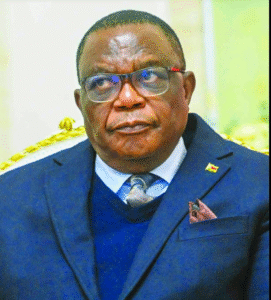MWONZORA’S ROLE IN ZANU PF’S POLITICAL STRATEGY EXPOSED
To politically informed Zimbabweans, it comes as no surprise that Douglas Mwonzora continues to be used as a political instrument by the ruling ZANU PF party. Many critics view him as having betrayed the democratic struggle in Zimbabwe by aligning himself—either directly or indirectly—with a party that has long been accused of undermining national democratic values, weakening state institutions, and pursuing policies that have harmed citizens’ livelihoods and human rights.
Mwonzora’s continued political actions are seen by many as serving the interests of a deeply entrenched political elite, rather than those of ordinary Zimbabweans who remain burdened by poverty, unemployment, and poor service delivery. His moves are viewed as an extension of a political strategy that seeks to divide and weaken the opposition, while protecting the status quo that has persisted for over four decades.
At the heart of these criticisms is a broader concern about governance in Zimbabwe. The state, under ZANU PF, has been widely accused of operating with limited transparency and accountability. Essential services such as healthcare, education, clean water, and food security remain under strain, despite being enshrined as basic constitutional rights. The gap between citizens and their leadership continues to grow, particularly in rural areas where voters are often subjected to politicized aid distribution and coercion.
What is most troubling now, observers say, is the attempt to manipulate electoral processes. Recent indications suggest efforts may be underway to avoid or delay elections, with Mwonzora allegedly playing a role in legitimizing such undemocratic moves. This has sparked outrage among pro-democracy activists who fear that ordinary citizens could be denied their constitutional right to choose their leaders through free and fair elections.
By positioning himself in ways that appear to support these anti-democratic tendencies, Mwonzora risks further alienating himself from the very citizens whose struggles he once claimed to represent. At a time when many Zimbabweans are battling rising costs of living, joblessness, and a deteriorating public health system, they are increasingly frustrated with political actors seen as prioritizing personal ambition over public service.
Zimbabwe is at a crossroads. The demand for accountable governance, respect for constitutional rights, and meaningful democratic participation is growing stronger. Attempts to sideline elections or suppress dissent will only deepen the country’s governance crisis and widen the gap between the leadership and its people.
The path forward requires a renewed commitment to democracy, inclusion, and reform. Political leaders must be held accountable for their choices—particularly when those choices appear to undermine the will of the people. As the country continues to face profound socio-economic and political challenges, it is clear that Zimbabweans deserve leadership that puts the nation first.



